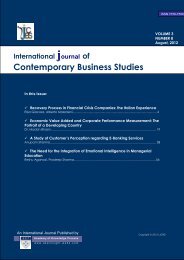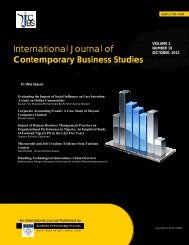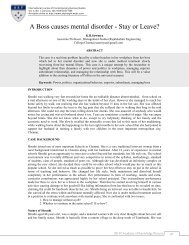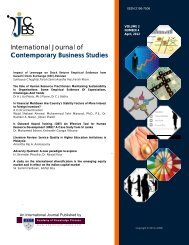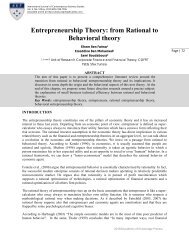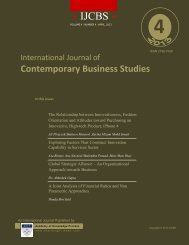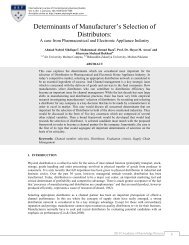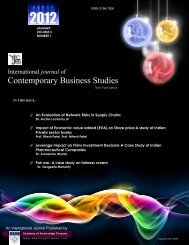Contemporary Business Studies - Academy of Knowledge Process ...
Contemporary Business Studies - Academy of Knowledge Process ...
Contemporary Business Studies - Academy of Knowledge Process ...
You also want an ePaper? Increase the reach of your titles
YUMPU automatically turns print PDFs into web optimized ePapers that Google loves.
International Journal <strong>of</strong> <strong>Contemporary</strong> <strong>Business</strong> <strong>Studies</strong>Vol: 4, No: 2. February, 2013 ISSN 2156-7506Available online at http://www.akpinsight.webs.comPROPOSITION:4:National culture dimension <strong>of</strong> gender egalitarianism moderates the relationship betweeninternational diversification strategy and performance.4(a) If the culture <strong>of</strong> parent and subsidiary company matches by gender egalitarianism, it willenhance the performance in case <strong>of</strong> international diversification.4(b) If the culture <strong>of</strong> the parent and subsidiary company do not matches by gender egalitarianism, itwill affect the performance negatively in case <strong>of</strong> international diversification.Future Orientation is the level to which individuals in organizations or societies engage in future-orientedbehaviors such as planning, investing in future, and delaying gratification. This concept has evolved from(Kluckhohn & Strodtbeck’s, 1961) future oriented culture are more likely to give emphasis to associationwith others on the place <strong>of</strong> work, and to use those relationships as the basis <strong>of</strong> their influence tactics,consequently leaders in such societies are less likely to use pressure or other assertive strategies, thatmight hurt future relationships ( House et al ,1999). Differences in long-term orientation could representdifferences in how partners perceive and adapt to opportunities and threats in their environment(Schneider, 1991; Schneider and De Meyer, 1991). Cultural clash can happen in case <strong>of</strong> different nationalcultural <strong>of</strong> parent and Subsidery Company (Brock, Barry, & Thomas, 2000). Very, Lubatkin, and Calori(1996) observed the influence <strong>of</strong> national culture in merger and post acquisition performance <strong>of</strong> crossnational firms.Pothukuchi et al.'s (2002) suggested that associates’ cultural differences may have more influence oninternational alliance performance as those differences become more directly related to the alliance'sprimary value-creating activities. Luo and Peng (1999) argue that differences in national culture tend tolower performance when MNEs enter new markets.Now we can propose the following:ROPOSITION: 5 National culture dimension <strong>of</strong> future/long term orientation moderates therelationship between international diversification strategy and performance.5(a)If the national culture <strong>of</strong> a parent company and subsidiary company is same in future orientationthat will enhance the performance <strong>of</strong> the firm going for international diversification.5(b) If the national culture <strong>of</strong> a parent company and subsidiary company is different in futureorientation that will negatively affect the performance <strong>of</strong> the firm going for internationaldiversification.Performance Orientation refers to the degree to which an organization or culture cheers and rewardsgroup members for performance development and distinction. This element includes the future orientedcomponent <strong>of</strong> the dimension called Confucian Dynamism by (H<strong>of</strong>stede and Bond, 1988). PerformanceOrientation was derived from (McClelland’s, 1975) work on need for achievement. Luo and Peng (1999)argue that differences in national culture tend to lower performance when MNEs enter new markets.Cultural clash can happen in case <strong>of</strong> different national cultural <strong>of</strong> parent and Subsidery Company (Brock,Barry, & Thomas, 2000). Very, Lubatkin, and Calori (1996) observed the influence <strong>of</strong> national culture inmerger and post acquisition performance <strong>of</strong> cross national firms.Pothukuchi et al.'s (2002) suggested that associates’ cultural differences may have more influence oninternational alliance performance as those differences become more directly related to the alliance'sprimary value-creating activities. One having this literary support we are in a position to propose thefollowing proposition about performance orientation.PROPOSITION:6:National culture dimension <strong>of</strong> performance orientation moderates the relationship betweeninternational diversification strategy and performance.2013©<strong>Academy</strong> <strong>of</strong> <strong>Knowledge</strong> <strong>Process</strong>94



